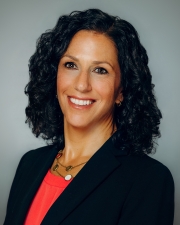Former Secretary of Education Arne Duncan calls for strong education policy to support democracy

As education grows more politicized, former U.S. Secretary of Education Arne Duncan urged Americans to focus on our country’s most important assets: our students.
“Education should be the ultimate bipartisan and nonpartisan issue,” said Duncan, who served in President Obama’s administration from 2009–2015.
In a wide-ranging conversation with Penn GSE Dean Katharine Strunk titled, “Focus Forward: Future of American Education Policy,” Duncan explored how the politicization of education is fueling upheaval in both K–12 and higher education and shared his views for strengthening education.
“A great military is our best defense as a country, but our best offense is a world-class education system,” said Duncan, former CEO of Chicago Public Schools and current director of the nonprofit Chicago Red and managing partner of Emerson Collective.
A key component of Penn GSE’s strategic plan, Together for Good, is elevating education’s role in democracy. This online conversation, hosted by the McGraw Center for Educational Leadership, was one of a number of related events this semester promoting dialogue around that theme.
Strunk, the George and Diane Weiss Professor of Education, said education is the “foundation of a just and thriving democracy,” and emphasized the need to build systems that empower students and support educators. However, she added, “The question now is how do we meet and make this difficult moment.”
Duncan shared the four “Ts” he believes are critical to student success: technology, tutoring, time, and talent. He sees promise in tools like AI to personalize learning and advocated for “high-dosage tutoring” to help students recover and thrive. He also encouraged rethinking how schools use time—with options like longer school years or days to meet community needs.
The most important “T,” he said, is talent—recruiting and retaining high-quality teachers. As more educators leave the profession or avoid high-need schools, Duncan said states and districts must offer competitive pay, career advancement, and loan forgiveness.
“If we are serious about closing gaps, we’d think about incentives to get our highest performing teachers and principals to work in communities that need it most,” he said.
Duncan also spoke about his time as education secretary, detailing how he spent time on the ground with local officials, students, and parents, including in rural areas and Republican-led states. He worked closely with politicians from both parties, including former Gov. Bill Haslam (R-Tenn.) and former Rep. Tom Harkin (D-Iowa), who shared a commitment to equitable education as a path to opportunity.
“There are commonalities between what kids need and what parents want, and they are so much larger than geographic or regional challenges,” Duncan said. “I’ve never met a parent who didn’t want the best for their kids.”
Duncan identified four key priorities to strengthen American education: access to Pre-K; improving third-grade reading scores; raising high school graduation rates; and leading the world in college completion. These goals, he said, are essential to democracy.
However, as the Trump administration rolls back the Department of Education and proposes shifting more responsibilities to the states, Duncan noted his concerns. The states, he said, already play a leading role in education: About 90 percent of public school funding comes from state and local governments, while the federal government contributes only about 10 percent. But, he said, federal funding supports the country’s most vulnerable students through preschool programs, free meals, and disability services. The department also upholds civil rights protections.
Duncan warned that without federal oversight, there could be significant disparities based on where children live and who governs the state.
“States are not always good actors, whether it is a lack of investment, a lack of commitment to civil rights, or a lack of commitment to high standards. Often, the federal government is the backstop for those types of things,” Duncan said.
He likened the federal government’s role in education to the structure of the American military.
“We don’t have 50 armys, we don’t have 50 navies. We don’t have 50 marines, air forces because it is in our nation’s interest,” he said. “We don’t delegate it [to the states] because it is too important. Education is too important, too.”
For Duncan, education must rise above partisanship. He pointed out that President Nixon created Pell Grants, “that was not some liberal lefty thing.” In today’s environment, he urged educators and leaders to work together to develop bold, inclusive solutions. When Strunk asked how others can get involved, Duncan’s advice was simple: engage students.
“We need to reach young people where they are, it might be a brick-and-mortar school or university or college or community college. [It] might be in a community center, on their steps, might be a church basement, might be online,” he said. “Our kids need all of us more than ever before.”

